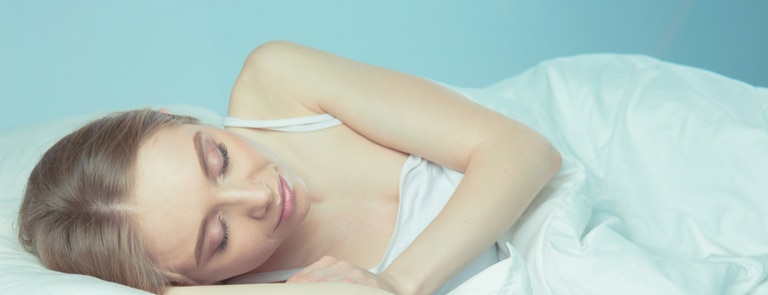15% off €35 OR 20% off €45
Best sleep supplements 2022

There is nothing worse than struggling to sleep and having a restless night.
Watching the clock as the hours tick by, worrying about how tired you will feel the next day and tossing and turning – we have all been there.
Getting enough sleep at night is so important for both your mental and physical health. When you are asleep, your brain and body slow down and start to recover, helping you perform better physically and mentally the next day and longer term.1
From counting sheep to taking a warm bath before bed, there are lots of sleep remedies you could try. But did you know there are many supplements that may also help to support a more restful, quality night’s sleep?
Here is our guide to the best supplements for sleep and relaxation. From vitamins to sleep sprays and more, read on if you need some sleep help!
Skip to:
10 sleep supplements
From internal supplements to aromatherapy and more, we’ve rounded up 10 of the best sleeping aids you can incorporate into your bedtime routine for a peaceful night’s sleep.
Magnesium is said to be one of the best sleep aids. This is because it helps increase GABA (Gamma-aminobutyric acid) levels, which encourages relaxation and sleep.
Low levels of GABA in the body can make it difficult to relax and switch off.2
Green, leafy vegetables such as spinach, or legumes, nuts, seeds, and whole grains are all excellent sources of magnesium.3
But if you are not getting enough through your diet, you can also take a magnesium supplement for sleep.
Valerian root contains compounds which help to support healthy sleep.4
Research has found that valerian inhibits the breakdown of GABA in the brain, which helps aid feelings of calmness and tranquillity.5
As well as this, valerian root contains the antioxidants hesperidin and linarin, which help to enhance sleep, and therefore it is used in lots of sleep remedies.6
Research has shown that vitamin C helps to boost sleep since individuals with a greater concentration of vitamin C in their bodies have a better sleep than those with a reduced concentration.7 Therefore, lots of sleep supplements contain vitamin C.
Vitamin C is mainly found in fresh fruits and vegetables such as oranges, lemons, peppers, berries, tomatoes, leafy greens, and potatoes.
You can take a supplement if you do not quite hit your five a day.
Studies have shown that a lack of vitamin D is associated with less sleep as well as a more disrupted night’s sleep.8
If your vitamin D levels are low, you might have less efficient and less restful sleep.9
We get most of our vitamin D through sunlight, which can be difficult to get during the winter months. And so, you can take a supplement to keep your levels of the sunshine vitamin topped up.
Vitamin E is used by the body as an antioxidant to help slow damage to cells and may help to ease restless legs.10
Restless legs syndrome is an overwhelming urge to move your legs, it often gets worse in the evenings and can cause sleeplessness as a result.11
Sources of vitamin E include plant oils such as rapeseed, sunflower, soya, corn, olive oils, nuts, and seeds.12 You can also take vitamin E supplements.
Research suggests that a good level of vitamin B12 in the body may help to give you a good night’s sleep.
Vitamin B12 helps to regulate the level of the amino acid tryptophan, which helps the body to produce melatonin, which induces sleep.13
Good sources of B12 include meat, fish, milk, cheese, eggs, and some fortified breakfast cereals.14
As most of these are animal products, anyone following a vegan diet can sometimes find it harder to get enough vitamin B12 through their diet.
Melatonin is a hormone that your body produces, that tells your brain when it is time to sleep.15
It’s influenced by the time of day, so it makes you feel sleepier in the evening and more awake in the morning. It is also thought that melatonin can reduce the time it takes to fall asleep, boosting the number of hours you get in a night.16
Because of this, it’s no wonder melatonin has become a talked about topic when it comes to sleep!
Melatonin is a prescription-only supplement or medication in the UK, so you will only be able to take a melatonin supplement with the approval of a medical professional.
If you decide to take a melatonin supplement, it’s important to remember that they are generally best for short-term use and shouldn’t be relied on for longer-term sleep issues.17
Maybe consider melatonin for short periods of sleeplessness, like jetlag. For long periods of sleep deprivation, like chronic insomnia, it’s best to talk to a doctor again to find the best treatment.
Melatonin is not recommended for those who are pregnant or breastfeeding, as there is limited research on its safety in these instances.18
The soothing fragrance of lavender has long been thought to help you sleep.
So much so that scientific studies have shown that smelling lavender oil before bed can help improve your sleep quality. Even if you struggle with insomnia.19
You can use lavender aromatherapy in several forms to help you drift off for a good night’s sleep, but Lavender oil should never be used neat on the skin – always dilute it with water or carrier oil before using it to avoid sensitivity and discomfort.
We recommend that you check with a doctor before using essential oils during pregnancy.
You might have heard of drinking chamomile tea to help you relax, and it’s no wonder, as chamomile has some great benefits.
Chamomile contains the antioxidant apigenin, which binds to receptors in your brain to help you feel sleepy.21
In one scientific study, people who took a form of chamomile extract twice a day for a month fell asleep 15 minutes faster than those who didn’t.22
Unlike chamomile, this is a sleep aid you may not have heard of before, but passionflower, or maypop, is a herbal remedy that has been used for hundreds of years for sleep.
Native to North America, passionflower has had proven sleep-promoting benefits but is best consumed as a tea instead of a supplement.
In a two-week study of people with insomnia, those who drank tea with passionflower saw improvements in the amount of sleep they got and felt more awake in the morning.23
The bottom line
Struggling to get to sleep is a common and frustrating problem, but luckily, there are many different things we can try to help us get our beauty sleep.
From sleep sprays to teas, sleep vitamins and more, you’ll surely find the best sleep aid supplement for you.
If you struggle to sleep frequently, it is always best to check with a doctor to find out the best way to help you get some rest.
The advice in this article is for information only and should not replace medical care. Please check with your GP or healthcare professional before trying any supplements, treatments or remedies. Food supplements must not be used as a substitute for a varied and balanced diet and a healthy lifestyle.
Last updated: 13 January 2023
- https://www.sleepfoundation.org/articles/what-happens-when-you-sleep
- https://www.psychologytoday.com/gb/blog/sleep-newzzz/201805/what-you-need-know-about-magnesium-and-your-sleep
- https://ods.od.nih.gov/factsheets/Magnesium-HealthProfessional/
- https://www.healthline.com/nutrition/valerian-root#TOC_TITLE_HDR_3
- https://pubmed.ncbi.nlm.nih.gov/18602406/
- https://www.sciencedirect.com/science/article/abs/pii/S009130570300368X
- https://www.heritageokc.com/blog/vitamin-c-is-best-for-your-sleep-health-want-to-know-why
- https://home.bt.com/lifestyle/health/sleep/tired-the-vitamins-and-minerals-your-body-needs-to-help-you-sleep-better-11364098011805
- https://blog.insidetracker.com/vitamin-d-can-improve-sleep
- https://www.winchesterhospital.org/health-library/article?id=21806
- https://www.nhs.uk/conditions/restless-legs-syndrome/
- https://www.nhs.uk/conditions/vitamins-and-minerals/vitamin-e/
- https://home.bt.com/lifestyle/health/sleep/tired-the-vitamins-and-minerals-your-body-needs-to-help-you-sleep-better-11364098011805
- https://www.nhs.uk/conditions/vitamins-and-minerals/vitamin-b/
- https://www.ncbi.nlm.nih.gov/pmc/articles/PMC6057895/
- https://pubmed.ncbi.nlm.nih.gov/33417003/
- https://pubmed.ncbi.nlm.nih.gov/28648359/
- https://pubmed.ncbi.nlm.nih.gov/26692007/
- https://www.ncbi.nlm.nih.gov/pmc/articles/PMC4505755/
- https://www.ncbi.nlm.nih.gov/pmc/articles/PMC6889391/
- https://www.ncbi.nlm.nih.gov/pmc/articles/PMC2995283/
- https://www.ncbi.nlm.nih.gov/pmc/articles/PMC3198755/
- https://pubmed.ncbi.nlm.nih.gov/31714321



